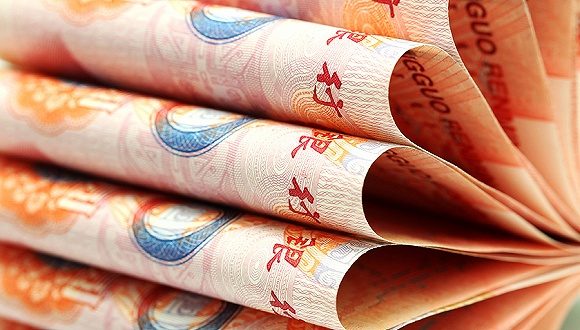According
to Central Bank, the newly increased credit in the first three quarters in
China was about RMB10.16 trillion, which means that the newly increased credit
may hopefully create a record high since the financial crisis in 2016.

Source: Internet
The Central Bank released the financial
data of China’s credit in the first three quarters on 18th Oct.
According to the statistics, the broad money (M2) increased by 11.5% YoY, which
was 0.1 percentage point higher than that of the end of last month. The narrow
money (M1), which mounted to the record high of 25.4% in the last six years,
increased by 24.7% YoY, 0.6 percentage point lower than the growth of the end
of last month.
According to Ruan Jianhong, new director of
Financial Survey and Statistics Department of Central Bank, the fall back of
the growth of M1 was mainly caused by falling growth of current deposits of M1.
Affected by the National Holiday, some current deposits in China were changed
into other deposits with higher profit such as call deposit, which reduced
current deposits. In addition, the decreasing current deposit was also caused
by the time when some financial institutions repaid the interests to clients at
the same time at the end of the quarter.
According to Central Bank, the newly
increased credit in the first three quarters in China was about RMB10.16
trillion, which means that the newly increased credit may hopefully create a
record high since the financial crisis in 2016. The newly-increased RMB loan in
Sep. was RMB1.2177 trillion. During the last nine months of 2016, the private
housing loan increased by RMB1.8 trillion YoY to RMB3.63 trillion, among which
the loan in Sep. increased by RMB20.55 billion YoY to 47.58 billion.
“Currently, new measures of regulations and
control on real estate market are published in some cities, and thus the trend
needs to be further observed,” according to Ruan, “one reason for the rapid
growth on the individual housing loan can be contributed to fragmentation of
China’s real estate market –some major cities boomed since the beginning of 2016,
other reason lies in the asset allocation of financial institutes and resident
department.”
At the same time, Central Bank released
that the social financing increment in the first three quarters in 2016 increased
by RMB1.46 trillion YoY to RMB13.47 trillion, among which the entrusted loan
increased by RMB1.51 trillion, trust loans increased by RMB479.5 billion, undiscounted
bank acceptance reduced by RMB2.05 trillion. In Sep., the social financing
increment was RMB1.72 trillion, with YoY growth of RMB363.8 billion
As regulators strengthened the management
on the bill, the bill of commercial bank continues to fall. Moreover, the high
growth on the newly increased credits and loans established a foundation for
the high growth of social financing. According to Zhou Hao, senior economist of
Commerzbank Asia, most of the entrusted loan and trust loan in social financing
were mezzanine loans for property developers buying land.
With the huge increase on the credit in Sep.
and the signs emerged from the speech made by the president of central bank,
the development of the future monetary policy would turn to be the key to the
future market.
According to an inside banker, generally
speaking, the credit would increase in Sep., while in the fourth quarter, the
newly increased credit would continually reduce till the first quarter of 2017.
According to Zhou, both the mortgage of the
resident and the direct financing in the social financing were related to the
real estate, and therefore the policy tightening was inevitable. Moreover, the
continuing relaxing on the monetary policy would just be benefited to the real
estate market, and it would be more difficult to lower the deposit-reserve
ratio and interest. The policy turned to the direction of risk management.
According to Deng Haiqing, chief economist
of JZ Securities, the financial data of Sep. shows that China’s enterprises
haven’t faced the financing demand contraction caused by worrying on economic
slow-down yet, on the contrary, the de-leverage pressure from the reform of
supply front went up. The Central Bank of China needs to keep maintaining the
moderate monetary policy to avoid de-leverage too much.
According to Zhou Xiaochuan, president of
Central Bank, the fast growing on China’s credit reflected the effort that
China made to manage the risk and promote the economic growth under the
circumstances of sluggish global economy.
Just half a year ago, Zhou mentioned, for
the first time, that China’s monetary policy, which needs constant observations
and adjustments, maintained a prudent monetary policy with slight easing bias.
From “prudent monetary policy with slight
easing bias” to “have the control on the credit increase”, the monetary policy
may officially fall back to the moderate.
According to Jiang Chao from Haitong
Securities, the controlling on the real estate bubbles, short-term picking up
on inflation, and the raising in interest rate in FED have all suppressed the
short-term easing monetary policy. Moreover, the speech recently made by Zhou
means that the process of lowering deposit-reserve ratio may postpone once
again, while the reverse repo period prolonging refers the increase on the cost
of capital in a short time. As the government strengthened the regulation and
control on the real-estate market, the risk of economic downturn goes up, which
also means a long-term decrease on the capital demand and the long-term easing
on market liquidity.
*The
article is edited and translated by CCM. The original one comes from Jiemian.com.
About CCM:
CCM is the leading market intelligence
provider for China’s agriculture, chemicals, food & ingredients and life
science markets. Founded in 2001, CCM offers a range of data and content solutions, from price
and trade data to industry newsletters and customized market research reports. Our clients include Monsanto, DuPont, Shell, Bayer, and Syngenta. CCM is a
brand of Kcomber Inc.
For
more information about CCM, please visit www.cnchemicals.com or
get in touch with us directly by emailing econtact@cnchemicals.com or
calling +86-20-37616606.